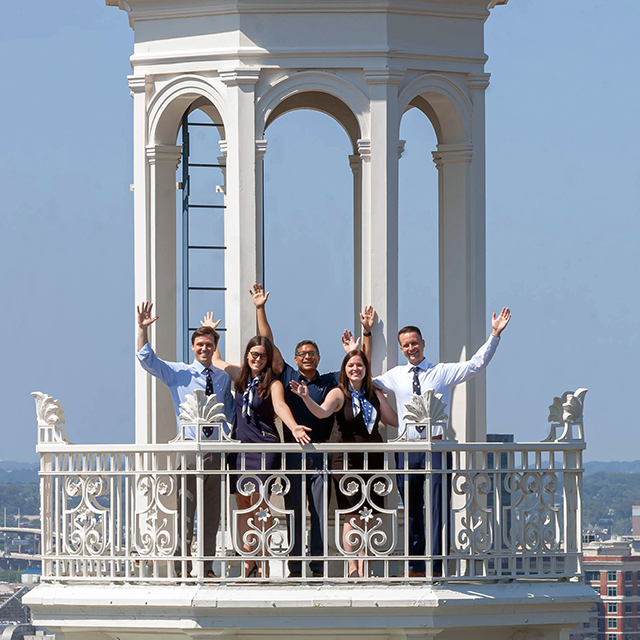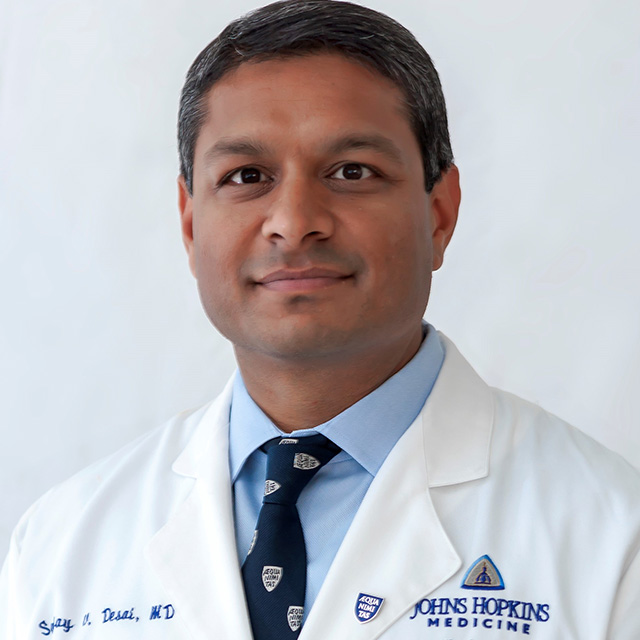After graduating from the Medical College of Pennsylvania, Eirum Chaudhri (Barker, 1989) arrived on the floors of Halsted 4 for her internal medicine residency during the height of the HIV/AIDS epidemic. She would go on to complete a GI fellowship at New York Hospital-Cornell University Medical Center in 1994. Her mother, who trained as a pathologist in the U.S. — many years after being one of the first female graduates from Fatima Jinnah Medical University in Lahore, Pakistan — served as inspiration for Chaudhri to choose a career in medicine. “Having such a strong, successful matriarchal figure as a guiding compass in my life was a blessing I did not recognize until many years later,” Chaudhri says.
Over the past 15 years, Chaudhri’s work has largely centered on supporting the development of novel therapies for chronic hepatitis C and nonalcoholic steatohepatitis (NASH). Since 2012, she has served as executive director of scientific affairs at Merck. She’s also a charter member of the Osler Advisory Board, a group of 12 alumni who help to create the best possible training experiences for residents. The mother of two accomplished daughters, Chaudhri lives in northern New Jersey.
Describe some of your roles and accomplishments at Merck.
In 2006, I took a position in research and development at Schering-Plough, and stayed on after the merger with Merck. Working in pharma was a relatively uncommon career pathway for physicians at the time. My one regret is that I did not join the company sooner! At times, I miss the fulfillment that comes with direct patient care, but the ability to make a difference at a global population health level by bringing forward novel therapies for diseases — an unmet need — is a great motivator and brings so much satisfaction.
Over the course of my 15 years at Merck, I have taken on a variety of roles in clinical development and medical and scientific affairs. The first 12 years of my pharma career were largely focused on the development of novel direct-acting antivirals for chronic hepatitis C. The heady pace of innovation was such that the standard of care shifted in very short periods of time.
Bringing the first direct-acting antiviral to patients as an addition to the standard of care took sustained virologic response rates — from 20% to 75%. That was just the first short-lived step toward where the hepatitis C field is today, with multiple all-oral therapies and cure rates close to 95%. Being part of that journey was probably the most satisfying experience of my pharma career thus far.
Over the past several years, I have shifted my efforts to NASH, another area where there is a tremendous unmet need. Earlier this year, I pivoted to develop novel therapies for autoimmune diseases, through modulation of regulatory T cells.
How has your Osler training shaped your career, and who were your role models?
The values that Hopkins represents — hard work, rigor, always striving for excellence — intersected with my personal values and guiding principles. Franklin Herlong (Osler, 1977) first sparked my interest in liver disease. He conducted monthly roundtable meetings with the house staff, teaching us the nuances of diagnosing liver disease based on the patterns of LFT elevation and taking a good medical history. Being such a skilled clinician, Professor Herlong brought together the science and art of medicine in such an inspirational way for me. Theodore Bayless [former director emeritus of the Meyerhoff Inflammatory Bowel Disease Center, who died in 2019], an expert in inflammatory bowel disease, confirmed my interest in specializing in gastroenterology and liver disease. Observing his patient-centric approach of really listening to his patients with Crohn’s disease or ulcerative colitis and trying to address their symptoms left a lasting impression on me about what good patient care looks like.
What would you say have been your greatest challenges and triumphs over the course of your career?
When I was in my early 30s, I was diagnosed with an autoimmune disorder — at the start of my career and in the prime of my life. It was a very disheartening diagnosis. I made the difficult decision to leave clinical practice and focused my efforts on improving my health and caring for my children. This circuitous route led me to where I am today — and speaks to the upside that comes with every challenge.
As for my greatest triumphs, raising my two daughters was the most significant achievement of my life. They are in their 20s and are blossoming in their careers and personal lives.
Describe what it was like for you working at Johns Hopkins during the height of the HIV epidemic.
During my Osler residency, many patients with HIV infection were admitted to Osler 8. AZT was the best we could offer them at the time. It was very challenging to watch so many patients die of opportunistic infections. Since then, it has been heartening to work for a company with a longstanding and ongoing commitment to developing new therapies for people living with HIV/AIDS.
To what extent does your residency experience inform your work — and how?
To me, it’s about the underlying principles that were part of the Osler housestaff experience. That means going above and beyond — not giving up, striving for excellence. These remain my guideposts in the work I do today: to always be open to learning, do my best and believe in myself.
Describe your role on the Osler Advisory Board and what the group aims to accomplish.
As one of the first members, I was encouraged to provide input on how the Osler Medical residency Program can better address diversity and inclusion and how to best support the various pathways for residents, including the physician-scientist pathway, which is so important to successfully translate our understanding of disease biology to the clinic. As a woman with South Asian roots, I’m proud to serve as a sounding board for the residency program. We meet at least twice a year (virtually, because of COVID-19). It’s a coming together of Osler alumni who share a passion to maintain the quality and culture of the residency.


